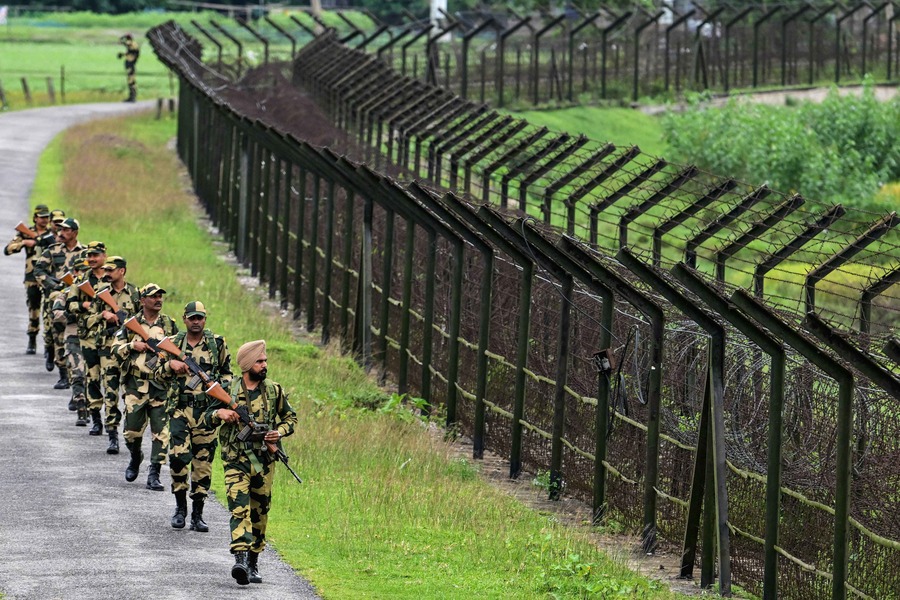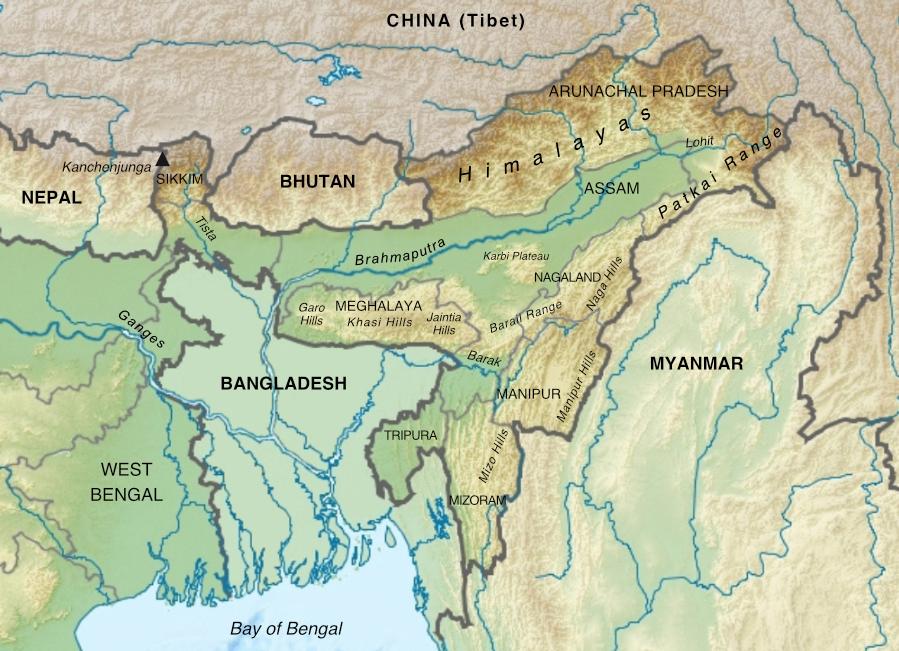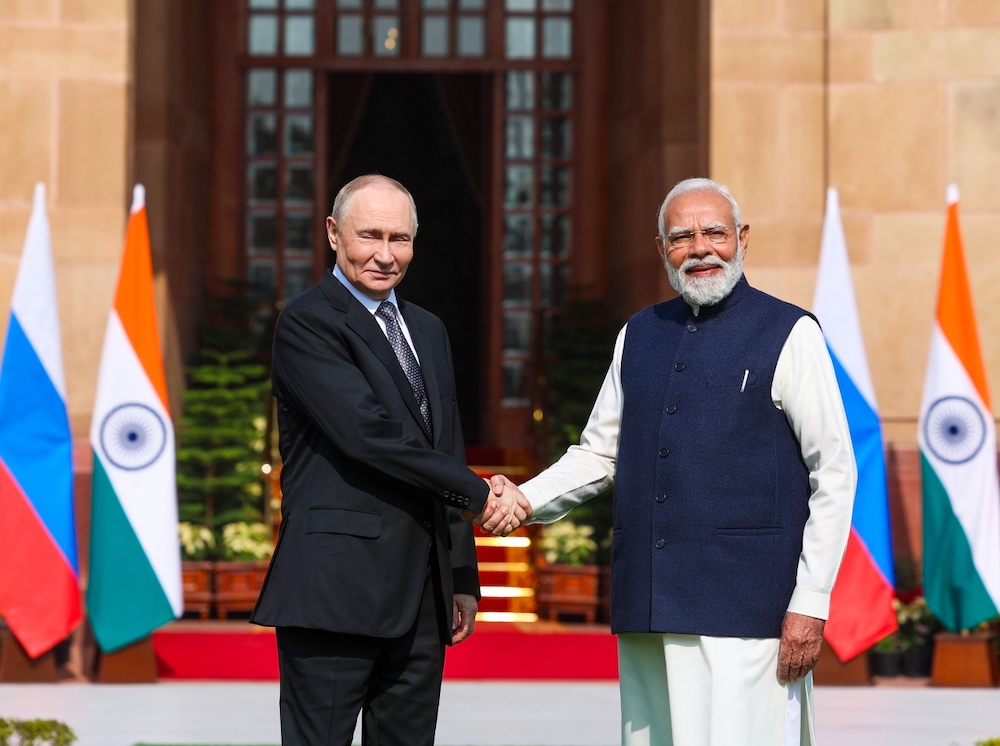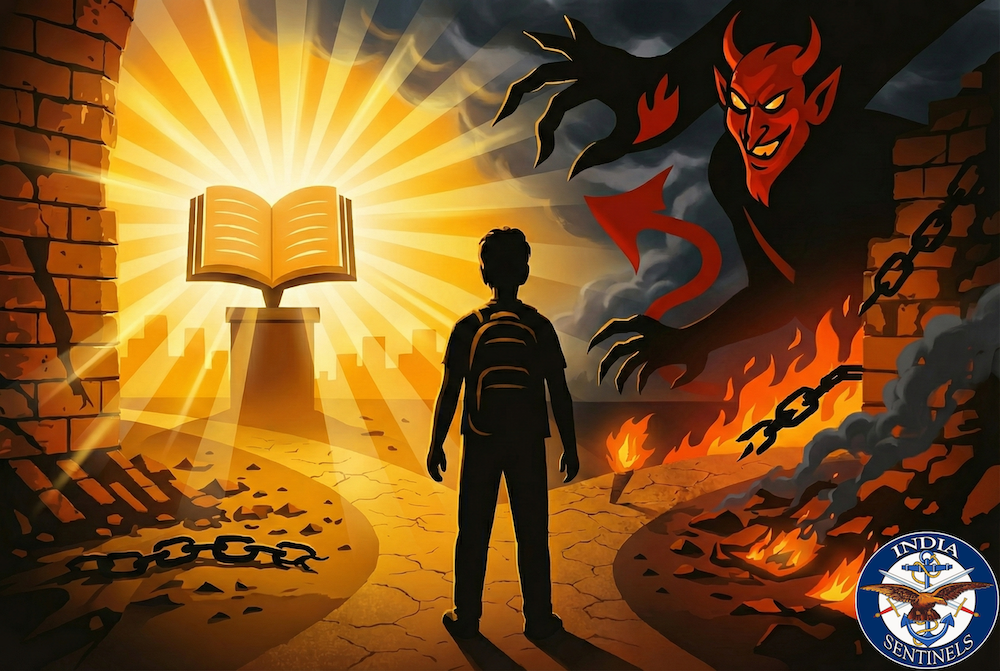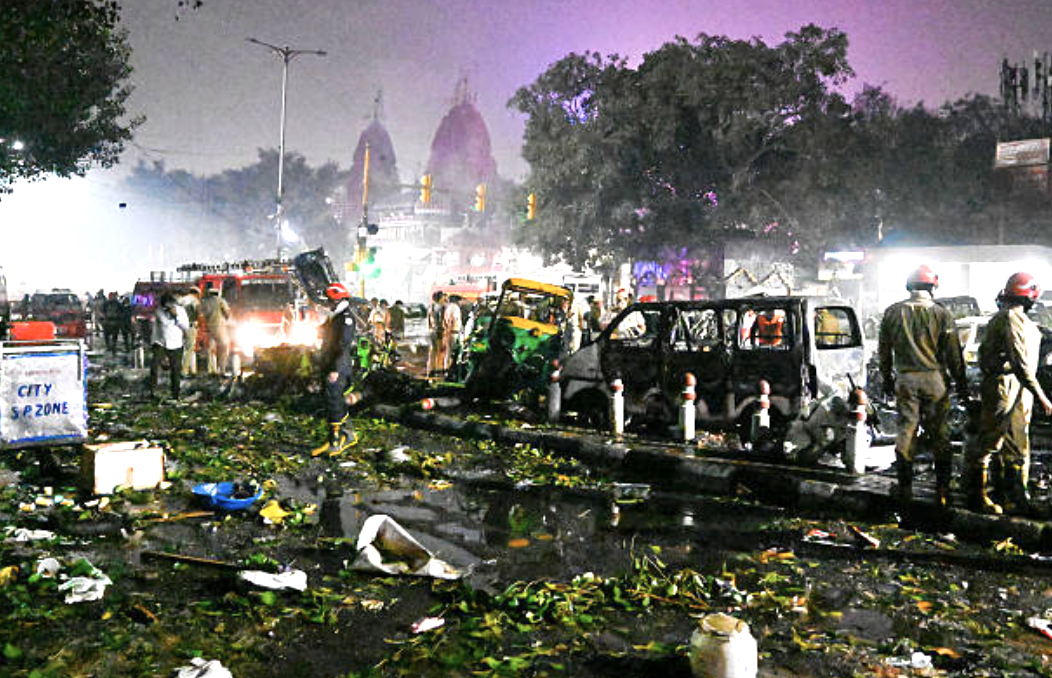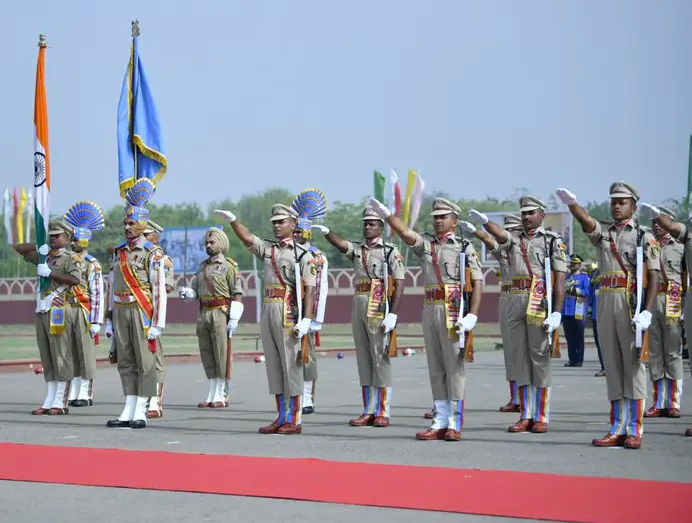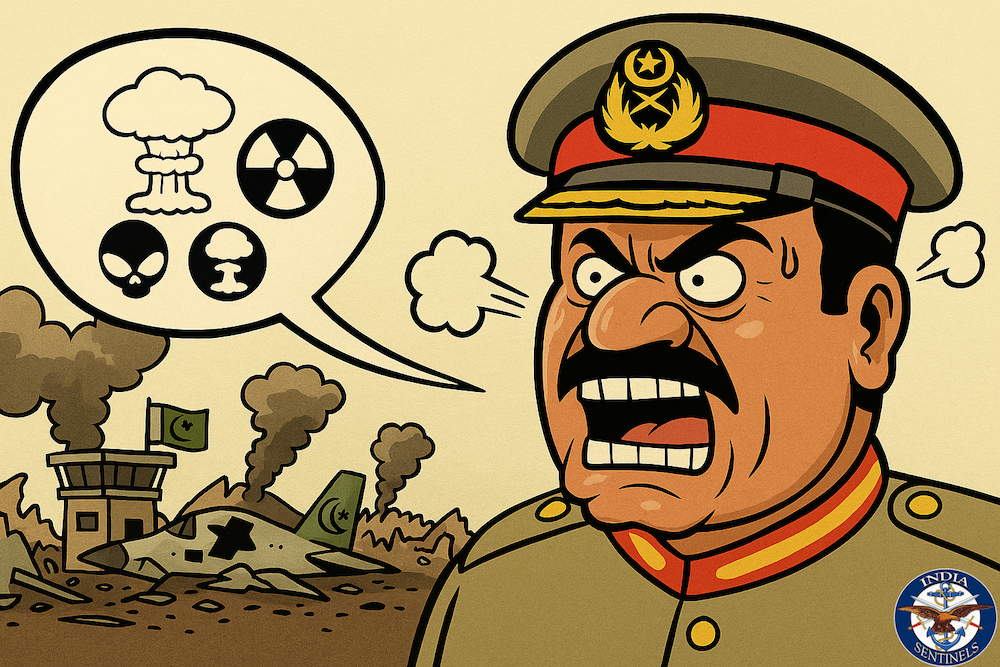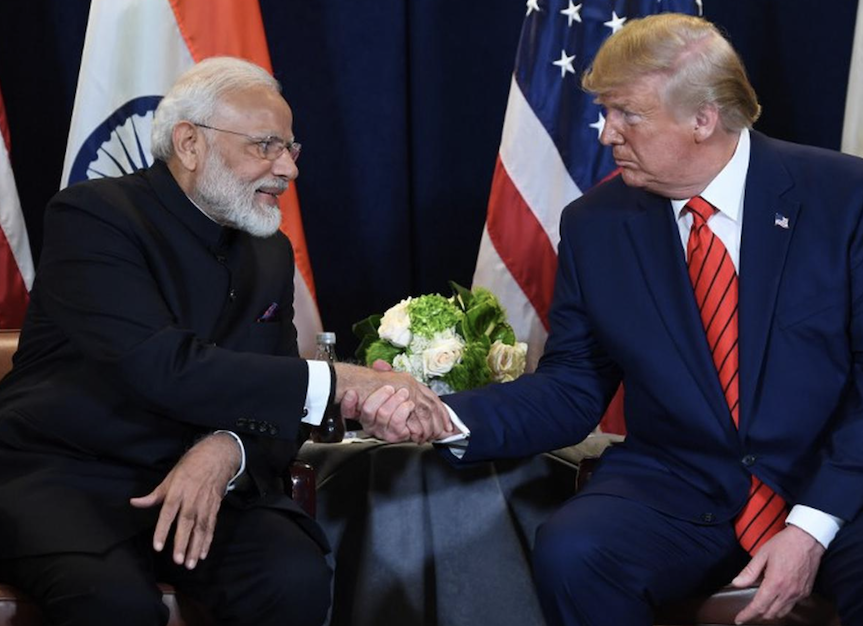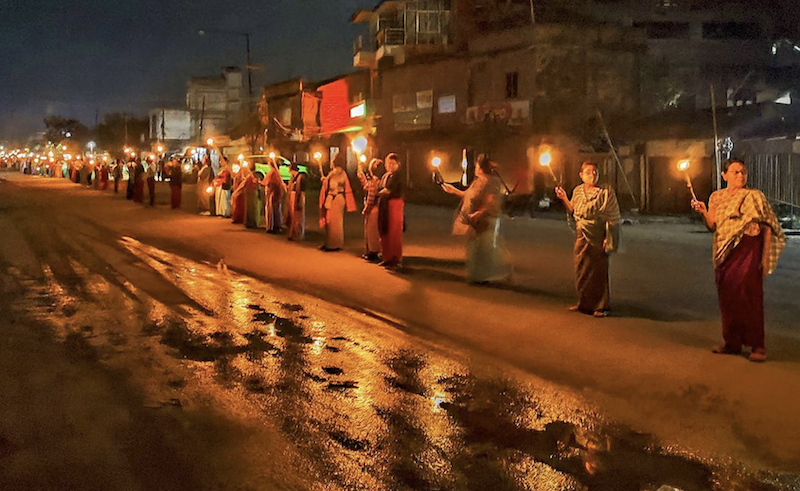 Women in Imphal hold a candlelight vigil to end the ethnic violence that has gripped the state since early May. (Photo: Twitter)
Women in Imphal hold a candlelight vigil to end the ethnic violence that has gripped the state since early May. (Photo: Twitter)
Manipur is a landlocked state that shares a 398-kilometre international border with Myanmar. The international border is highly porous. A “free movement regime” exists between India and Myanmar. Under the free movement regime, every member of the hill tribes, who is either a citizen of India or a citizen of Myanmar and who is resident of any area within 16 kilometres on either side of the India-Myanmar border can cross the border on production of a border pass (with one year validity) issued by a competent authority. They can stay in the neighbouring country up to two weeks per visit.
This means that free movement is easily possible through the authorized crossing points and through the highly porous border. Here, it is also worthwhile to mention that about 67 per cent of the geographical area of Manipur is a hilly tract covered with forests.
Manipur currently is in the grip of unabated ethnic violence, which shows no signs of subsiding. The ethnic violence, which started on May 3, continues. The violence has brought into fore the deep fault lines that already exist between the state’s tribal and non-tribal population. The failure of police and administration in containing the violence, which led to death, destruction, and mass displacement of the population, aggravated these fault lines further.
A tweet by Lieutenant General L Nishikanta Singh (retired) aptly sums the highly volatile Manipur situation. In the June 15 tweet, he said: “I’m just an ordinary Indian from Manipur living a retired life. The state is now ‘stateless. Life and property can be destroyed anytime by anyone just like in Libya, Lebanon, Nigeria, Syria, etc. It appears Manipur has been left to stew in its own juice. Is anyone listening? [Sic.]”
His words should have been taken as a forewarning by the government. There is a need for both the Union and state governments to intervene aggressively to bridge the social and political chasm between the tribal and non-tribal communities. The state may be heading for a long haul of socially divisive violent conflict, which will prove detrimental to national security if not tackled deftly and peace not restored. There are already signs that external powers inimical to India’s security interests have started exploiting the conflict to meddle in the state’s affairs and sow the seeds of separatism.
What led to ethnic conflict in Manipur is known; however, who fuelled the conflict, played what role in violence will only be authoritatively known once the commission of inquiry, which is headed by a former Guwahati high court chief justice, Ajai Lamba, submits its report on the causes that triggered the violence.
It is the constitutional responsibility of the Union and state governments to restore peace in the state. Both the Union and the state need to take people-friendly measures in consonance with ground realities and practicalities after an in-depth analysis of the situation.
Those in power must work in true earnest to end the cycle of violence, rebuild homes, and create the environment for the return of displaced people. They must first accept that the conflict in Manipur is not restricted to the Meitei-Kuki conflict but is more than an ethnic clash between two communities. It is a conflict for survival of the tribal communities who have been dubbed as “encroachers” by the state in a highly objectionable move without following due procedure.
Manipur is presently in a lawless chaos. However, the Narendra Modi-led government in the Centre, in an all-party meeting, claimed that Manipur is closer to normalcy as there has been no violence-related death since June 13. This is even though in the last 50 days or so, more than 120 people have lost their lives and more than 50,000 people were displaced from their homes.
Besides, how could normalcy be claimed when the security forces in the Imphal East district were recently forced by a mob of women to release 12 apprehended militants of the Kanglei Yawol Kanna Lup (KYKL) – a Meitei militant group involved in number of attacks, including ambush of 6 Dogra unit in 2015 that killed around 20 Indian Army soldiers? (The alleged mastermind of the 2015 ambush was among the 12 freed.)
The decision is an indicator that the state is still on boil and needs a healing touch. Therefore, the question that arises now is: what are the steps needed to be taken to provide succour to the affected people to calm the situation and bring peace?
Initiate a discussion, talk with all stakeholders not to build consensus, which may be difficult to achieve, but to understand everyone’s point of view on the crisis and make an effort to narrow their differences. Disarm all militant groups and ensure that looted arms from state armouries held by non-state actors are retrieved. In case the militants and non-state actors don’t surrender the looted arms voluntarily, use force to disarm them, if required.
The suspension of operations (SoO) agreement was a tripartite agreement signed between the Union home ministry, state government and militant groups. It was everyone’s responsibility to honour the tripartite agreement. However, the Manipur government unilaterally withdrew its commitment towards it. This action by the state seems to have further fuelled the violence.
The Union and the Manipur governments have announced a compensation of ₹10 lakh to the next of kin of those killed in the violence and a government job to one member of the deceased’s family. This compensation package needs enhancement. Similarly, those displaced and their homes destroyed need to be compensated adequately to enable them to rebuild their homes and start normal lives. A comprehensive package for the purpose needs to be announced.
The package of ₹101.75 crore for displaced people is highly inadequate and needs to be enhanced to cover the full cost of rebuilding damaged homes.
The security apparatus in Manipur has not been able to quell the violence and the state failed in its constitutional duty of protecting the life and property of people. There is an immediate need to place the state under the president’s rule for ensuring the establishment of a people-friendly administration. This includes the restoration of trust and confidence in the administration as the current state government has lost it since it failed in its primary duty of maintaining law and order.
The ethnic clashes were triggered by the “Tribal Solidarity March”, which was organized in Manipur’s hill districts on May 3 to protest the Meitei community’s demand to be given the status of a “scheduled tribe”. It is a fact that Meiteis account for about 53 per cent of Manipur’s population, most of whom live in the valley. On the other hand, the tribal communities, like the Kukis, constitute about 40 per cent of the state’s population and mostly reside in the hill districts.
The Meiteis want to expand horizontally, which will certainly affect the tribal communities and their rights over land. This fear is at the heart of the present conflict. There are developmental disparities in the infrastructure between hill regions and the Imphal valley. It needs a correction.
The Union and the state governments must recognize and address the disparities between Meitei-dominated areas and the areas where most of the tribespeople live. This will be a major step towards healing the wounds of Manipur by investing in politics of peace and development instead of patronizing identity politics for votes. Otherwise, this may further shred the already disintegrated social fabric of the state.
The ball is in the government’s court to decide which way it wants to lead Manipur.
Disclaimer: The views expressed in the article are the author’s own and don’t necessarily reflect the views of India Sentinels.
Follow us on social media for quick updates, new photos, videos, and more
Twitter: https://twitter.com/indiasentinels
Facebook: https://facebook.com/indiasentinels
Instagram: https://instagram.com/indiasentinels
YouTube: https://youtube.com/indiasentinels
© India Sentinels 2022-23

